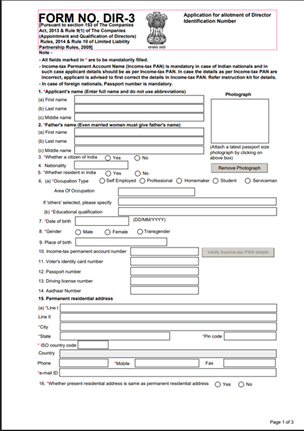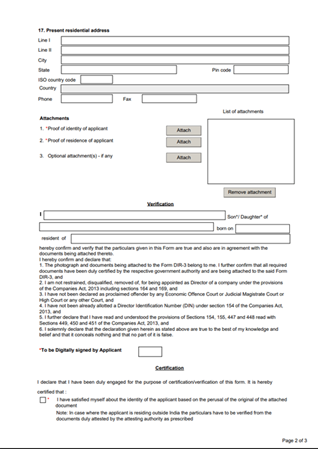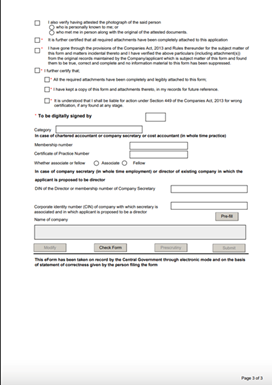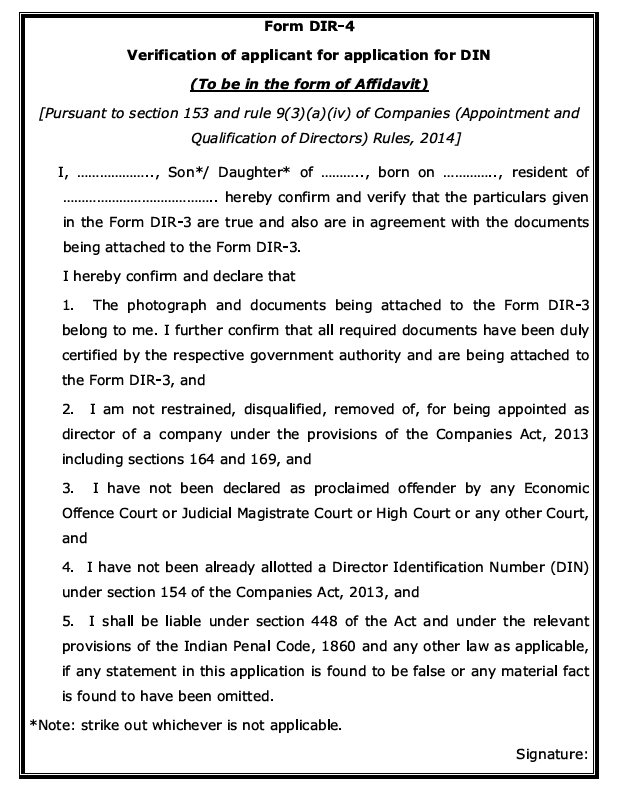India’s rise as a global economic power is no longer a future forecast—it’s a present reality. With the country now ranking as the 5th largest economy and projected to be among the top 3 by 2050, it’s no surprise that India is attracting global interest. A major sign of this interest is the increasing number of Foreign Nationals seeking directorship in Indian companies.
At CA B K Goyal & Co LLP, we’ve observed a significant uptick in inquiries and engagements around appointing Foreign Directors in Indian Companies. This trend is reshaping India’s corporate landscape and opening doors to diverse expertise, innovation, and global networks.
In this article, we walk you through everything you need to know about this important development.

Who is a Director as per the Companies Act, 2013?
Under the Companies Act, 2013, a Director is an individual appointed to the Board of a company to manage and direct its affairs. Directors can be Indian residents or foreign nationals. There is no restriction on nationality—however, every company must have at least one Indian resident Director.
Types of Directors under the Act include:
- Independent Director
- Whole-time Director
- Alternative Director
- Managing Director
- Nominee Director
- Small Shareholder Director
- Additional Director
Who is a Foreign Direction?
Absolutely! Here’s a natural, human-written paraphrased version of the section “Who is a Foreign Director?”:
Who is Considered a Foreign Director?
A Foreign Director refers to an individual who is not an Indian citizen but has been appointed to the Board of Directors of an Indian company. The Companies Act, 2013, allows such appointments as long as the person meets the required qualifications and complies with Indian laws applicable to company directors.
To be eligible, the individual must first obtain a Director Identification Number (DIN) from the Ministry of Corporate Affairs (MCA). They must also provide valid identification and proof of residence, properly attested in accordance with international authentication norms. Additionally, the individual must formally consent to act as a director using the prescribed formats and filings.
A Foreign Director can either reside in India or live abroad. However, as per Section 149(3) of the Companies Act, 2013, every Indian company is required to have at least one resident director who has stayed in India for a minimum of 182 days during a financial year, regardless of how many foreign nationals are on the board.
Foreign Directors are often appointed to bring in global insights, fresh perspectives, and international business networks. Their presence can enhance the company’s reputation and governance—especially beneficial for businesses involved in foreign investments or cross-border trade. That said, under Indian corporate laws, Foreign Directors have the same responsibilities and duties as Indian directors—no special treatment or exemptions apply.
Advantages of Appointing Foreign Directors
Bringing a Foreign Director on board is more than a compliance allowance—it’s a strategic move. Here are some clear benefits:
- Global Perspective: Foreign Directors bring international experience and insights.
- Business Expansion: Helps Indian companies expand into new global markets.
- Policy Refinement: Brings improvements to existing internal processes.
- Diverse Clientele: Encourages collaborations and diversifies the company’s customer base.
Eligibility Criteria for Appointing a Foreign National as Director in an Indian Company
Under the Companies Act, 2013, Indian companies are allowed to appoint foreign nationals as directors. This move is designed to attract global investments, enhance corporate governance, and foster international collaboration. However, certain conditions must be met to ensure regulatory compliance and uphold transparency and accountability in corporate functioning. Here are the key pre-requisites and eligibility norms that a foreign national must fulfill to be appointed as a director in an Indian company:
1. Must Be a Natural Person
Only individuals—not companies, firms, or other entities—can serve as directors. A foreign national must be a living, natural person to be considered.
2. Legally Capable of Entering Into Contracts
The individual must be legally competent to enter into contracts both under Indian law and the laws of their home country. This means they should not be declared mentally unfit, insolvent, or be facing any legal prohibition that bars them from taking up a directorship.
3. No Disqualification Under Section 164
The Companies Act disqualifies individuals under Section 164 for reasons such as insolvency, criminal convictions exceeding six months, being barred by a court or tribunal, or failure to file returns and financial statements for three consecutive years (if they were previously directors).
4. Director Identification Number (DIN) is Mandatory
Every prospective director must obtain a DIN from the Ministry of Corporate Affairs. For foreign nationals, this involves filing Form DIR-3 along with:
- A notarized or apostilled copy of their passport
- Proof of residence
- Recent photograph
- Verification through Form DIR-4
FORM DIR - 3 Format/Sample



FORM DIR - 4 Format/Sample

5. Obtaining a Digital Signature Certificate (DSC)
Foreign directors must also get a Digital Signature Certificate (DSC) from an authorized certifying authority in India. This is essential for digitally signing MCA forms.
6. Written Consent to Act as Director
The person must give their formal written consent to take up the position. This is submitted in Form DIR-2, which must be attached to the company’s appointment documentation.
7. Resident Director Requirement
As per Section 149(3) of the Companies Act, every company must have at least one director who resides in India for a minimum of 182 days in a financial year. A foreign national can meet this requirement if they fulfill the residency condition.
8. Types of Directorships Allowed
Foreign nationals can be appointed to various types of directorships, such as:
- Executive Director – Involved in day-to-day management
- Non-Executive Director – Not involved in daily operations
- Independent Director – For listed companies, subject to independence criteria
- Nominee Director – Representing foreign investors or institutions
9. FEMA & RBI Compliance
If the foreign director is also an investor or represents a foreign corporate entity, their appointment must comply with the Foreign Exchange Management Act (FEMA) and follow RBI guidelines, especially in sectors that have FDI restrictions.
10. Valid Visa for India-Based Operations
Any foreign director operating from India must hold a valid business or employment visa. A tourist visa is not acceptable for serving as a director or participating in board meetings.
11. Disclosure of Conflicts of Interest
Foreign directors must disclose any direct or indirect interests they hold in other companies or entities. This disclosure is to be made through Form MBP-1, helping ensure transparency and protect the interests of the company.
Documentation Checklist
If the Foreign Director is residing in India:
- Resident Permit from FRRO
- Valid Visa
- Passport (attested by concerned Embassy)
If residing in home country:
- Passport & Address Proof (notarized & apostilled if the country is part of the Hague Convention; else, notarized and consularized)
If residing in a third country:
- Documents must be certified by the local Indian Embassy
For Business Visa:
- Proof of business background and financial standing
- Valid travel documents
- Proof of company activities and registration
Step-by-Step Process for Appointing a Foreign National as Director in an Indian Company
1. Obtain a Digital Signature Certificate (DSC)
To electronically file documents with the Ministry of Corporate Affairs (MCA), a Digital Signature Certificate (DSC) is required. Foreign nationals must secure a Class 3 DSC from a licensed Indian Certifying Authority.
Required documents include:
- A notarized and apostilled passport
- A recent passport-size color photograph
- Proof of address (e.g., utility bill or bank statement)
- A PAN card (optional for foreign nationals)
2. Apply for a Director Identification Number (DIN)
Foreign applicants must apply for a DIN by submitting Form DIR-3 via the MCA portal. The form must be signed using the obtained DSC.
Documents required for the DIN application:
- A notarized or apostilled passport
- A valid proof of address
- A recent photograph
- A board resolution (if representing a foreign entity)
3. Submit Consent to Act as Director
The proposed foreign director must submit their written consent in Form DIR-2. This document is retained by the company and may be filed with the Registrar of Companies (ROC) if required.
4. Conduct a Board Meeting
A board meeting must be held to formally approve the appointment of the foreign national as a director. If the company’s Articles of Association (AOA) require shareholder approval, then a general meeting must be convened to pass either an Ordinary or Special Resolution.
5. File Form DIR-12 with the ROC
Within 30 days of the appointment, Form DIR-12 must be filed with the ROC. Required attachments include:
- The consent form (DIR-2)
- Board or shareholder resolution
- Appointment letter, if any
6. Residency Compliance (Section 149(3))
Ensure the company has at least one resident director who has stayed in India for 182 days or more in the financial year. A foreign national who meets this requirement may be designated as the resident director.
7. Update Statutory Registers
Post-appointment, the company must update the Register of Directors and Key Managerial Personnel (KMP) as per Section 170 of the Companies Act. Other internal records like minute books, shareholding registers, and company master data should also be revised accordingly.
8. Disclose Interests in Other Companies
The newly appointed director must disclose any interests in other companies, contracts, or arrangements using Form MBP-1, which should be placed at the first Board Meeting following the appointment.
9. Comply with FEMA and RBI Guidelines
If the foreign director is an investor or represents a foreign entity, their appointment must align with the Foreign Exchange Management Act (FEMA) and relevant RBI regulations—especially in FDI-sensitive sectors.
10. Meet Tax and Regulatory Obligations
Foreign directors are subject to Indian tax laws. Any salary, sitting fees, or commissions they receive are taxable under the Income Tax Act, 1961. Companies must deduct TDS accordingly. In some cases, Double Taxation Avoidance Agreements (DTAAs) may apply based on the director’s country of residence.
Compliance Post Appointment
Income Tax Compliance
Foreign Directors earning in India are subject to tax under the Income Tax Act, 1961. TDS is applicable, and a PAN card is mandatory if transactions exceed ₹2.5 lakh in a financial year.
FEMA Compliance
Foreign Directors can receive remuneration, commission, and sitting fees like any Indian Director, but they must:
- Hold a valid Employment Visa
- Open & maintain a foreign currency account outside India
- Comply with FEMA regulations for salary remittance and reporting
Final Thoughts
The appointment of Foreign Directors is not just a legal formality—it’s a strategic decision that fosters global collaboration and strengthens India’s role in the world economy. While the process is largely similar to appointing an Indian Director, additional documentation and compliance under FEMA and taxation laws must be addressed.
If you’re considering bringing a Foreign Director into your Indian business, CA B K Goyal & Co LLP is here to guide you through every step—from compliance to execution.
